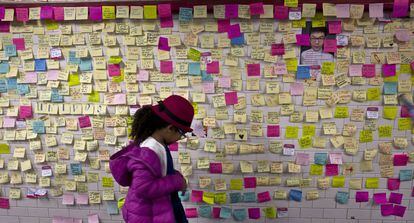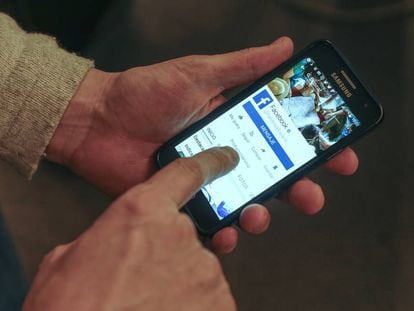How to combat post-truths
The lies on social networks played a decisive role in the US presidential campaign. But there are mechanisms to prevent this from happening
Who can blame 62 million Americans for voting for Donald Trump, considering the pope asked US Catholics to do so in order to make America strong and free? Or if it emerged during the campaign that Bill Clinton had abused a 13-year-old? And in light of the mysterious deaths that accompanied Hillary Clinton’s rise in the polls, including that of an FBI agent who was investigating the presidential candidate and a Democratic Party employee who was going to testify against her before a judge?

These are all hoaxes, but they reached millions of people dressed up as facts via Facebook, a site that 60% of Americans used during the campaign to keep themselves informed, according to the Pew Research Center. Twelve years after it was set up, this social network has become the biggest news site and TV channel on the planet, with 1.8 billion users, annual ad sales of $27 billion and no more regulation than that which it imposes on itself.
In the initial moments of shock following Trump’s victory on November 8, many fingers pointed at Facebook, where news priority is dictated not by an experienced editor but by algorithms that reward reader engagement above everything else. And it has become patent during these elections that many readers do not care whether a story is true or false when it comes to reading it, evaluating it and, above all, sharing it, thus helping it go viral.
Three months earlier, Facebook had fired a team of 18 editors who curated news that later featured in a news feed devoted to trending topics. Conservative media such as The Wall Street Journal had accused the small team of a bias towards left-leaning news items and, keen to maintain neutrality, Facebook officials acted swiftly, leaving news selection to the algorithms. It was only a matter of days before a majority of news stories within that space were viral videos of pets or fake stories.
When a lie is shared hundreds of thousands of times and manages to become part of the news cycle, it creates a bubble
And then the viral phenomenon moved from Facebook’s wall to the White House. Alarmed, a number of the company’s officials wondered whether the automated news selection had handed Trump the presidency. The Republican candidate won in small towns in Florida, Ohio and Pennsylvania, not in big cities like New York or Los Angeles, where the TV channels and the front pages of the newspapers were still helping to sift the truth from the lies.
The media has lost the power of distribution. For centuries, the sharing of information was in the hands of those who created it and later offered it to the masses for consumption via newspapers, radio newscasts and TV reports and, during the first years of the internet, also on web portals. Today, the life of a news story is influenced by many factors, and accuracy is just one of them.
Libel has always existed. But in the era of social networks, veteran media outlets employing reporters who are well trained in fact-checking are competing with impostors who conceal their lies under the guise of rigor, in their search for publicity, money or influence. Judging from his remarks after Trump’s victory, Mark Zuckerberg does not consider it a serious problem: “The idea that fake news on Facebook influenced the elections is crazy,” he said.
Crazy or not, just days later Zuckerberg got together with Google to deny access to advertising to websites running fake news. This is in fact no more than a stopgap, since money is not the only thing that generates lies. There are those who spread them for political gain, like Trump himself. In 2012, when he already had his sights set on the White House, he gave credence to the lie that President Barack Obama had been born in Kenya or Indonesia instead of the US by including it in his speeches.
This era of algorithms is paving the way for a dictatorship of the “post-truth”
In Facebook, when a lie is shared hundreds of thousands of times and manages to become part of the news cycle, it creates a bubble. Users who follow Trump or who are self-declared Republicans may well only see fake information on their Facebook walls, and not real news such as the maneuvers by the Republican candidate to avoid paying taxes, or his racist and misogynist comments that might have otherwise have triggered an abstention or a change in voting intention.
The fact is that this era of algorithms, automated systems and a lack of real journalism is paving the way for a dictatorship of the “post-truth,” a neologism chosen by the Oxford Dictionary as its Word of the Year for 2016, the year of the rise of populism. Its definition perfectly encapsulates the falsehoods that produced the first viral presidency: “An adjective defined as 'relating to or denoting circumstances in which objective facts are less influential in shaping public opinion than appeals to emotion and personal belief'.”
When Trump welcomed his first foreign dignitary in New York after becoming the president-elect, his advisers warned Shinzo Abe, Japan's Prime Minister, not to take Trump’s words literally. Reality is a stillborn concept for this presidency and, with it, any kind of commitment. It only took Trump a few days to backpedal on inflammatory campaign promises such as putting Clinton behind bars, breaking climate change agreements and encouraging nuclear proliferation.
Facebook and the other major internet sites are still in time to try and save themselves, and us, from this drift of things. All it takes is to incorporate exceptions into its algorithms for purveyors of news who invest in information, are subject to quality control and are held up to account. An algorithm can never engage in journalism, but it can learn to identify those who do, for the good of us all.
English version by Heather Galloway.













































